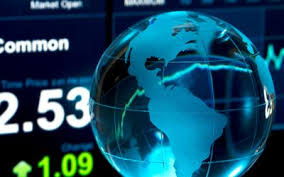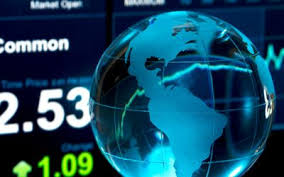
A lengthening list of uncertainties for investors already on edge over tensions simmering from North Korea to France was further added another uncertainty by a snap general election call in Britain and shares and the dollar fell on Tuesday.
And after stocks weakened in Europe and Asia, Wall Street also looked likely to open marginally lower, index futures ESc1 1YMc1 showed.
After British Prime Minister Theresa May called an early parliamentary election for June 8, sterling rose nearly 1 percent against the dollar and UK shares hit 2 1/2-month lows.
As Britain negotiates its way out of the European Union, she had decided "with reluctance" that an election was needed to secure political unity and stability, May said Speaking outside her Downing Street office.
Marking its lowest since late February, the FTSE 100 stocks index, already falling on its first trading day since the Easter break, fell further and was last down 1.8 percent.
"I guess people see that this may give Theresa May a better majority. It is a politically astute move and it should provide more stability going over the immediate aftermath of the exit from the EU," said Simon Derrick, head of global market research at Bank of New York Mellon in London.
investors have focused on political factors that also include Syria and U.S. relations with Russia and China with market activity reduced in the past week due to Easter holidays.
European shares fell on Tuesday. Led lower by a 3 percent fall in the basic resources, the pan-European STOXX 600 index , which hit 16-month highs last week, was down 0.9 percent.
While Tokyo's Nikkei closed up 0.4 percent on earlier yen weakness, MSCI's broadest index of Asia-Pacific shares outside Japan .MIAPJ0000PUS slipped by 0.7 percent.
Against a basket of major currencies .DXY, the dollar declined 0.3 percent. While agreeing with U.S. President Donald Trump that it hurt exports in the short term, U.S. Treasury Secretary Steven Mnuchin told earlier to the Financial Times that a strong dollar was a positive in the long term, the dollar was lifted off five-month lows versus the yen.
In the currency and debt markets, investor nervousness ahead of Sunday's French election made itself felt. While ultra-safe German equivalents dipped, taking the gap between the two close to six-week highs, French 10-year government bond yields initially rose.
But after an opinion poll put centrist Emmanuel Macron first in the first round of voting, just ahead of far-right, anti-euro candidate Marine Le Pen, with a bigger gap to far-left representative Jean-Luc Melenchon, the spread with Germany narrowed to its tightest in a week and French yields later fell while German yields edged up.
Jumping to their highest levels since Britain's vote in June 2016 to leave the European Union was the cost of hedging against big moves in the euro against both the dollar and the yen over the next month.
"Every poll that is coming out now is being scrutinized closely," said DZ Bank strategist Christian Lenk. "Nevertheless, markets remain very nervous ahead of Sunday."
Its highest since early November 2016 was hit by implied volatility in the STOXX 600 index. After Turkish President Tayyip Erdogan rejected Western criticism of a referendum in which he won sweeping new powers, Turkey's lira rose against the dollar.
"The markets are taking this initial result as positive insofar the buck now stops with one person and in theory political noise should come down," Greg Saichin, CIO emerging markets fixed income at Allianz Global Investors said. He added that the next battleground would be Turkey's 2019 election.
(Source:www.reuetrs.com)
And after stocks weakened in Europe and Asia, Wall Street also looked likely to open marginally lower, index futures ESc1 1YMc1 showed.
After British Prime Minister Theresa May called an early parliamentary election for June 8, sterling rose nearly 1 percent against the dollar and UK shares hit 2 1/2-month lows.
As Britain negotiates its way out of the European Union, she had decided "with reluctance" that an election was needed to secure political unity and stability, May said Speaking outside her Downing Street office.
Marking its lowest since late February, the FTSE 100 stocks index, already falling on its first trading day since the Easter break, fell further and was last down 1.8 percent.
"I guess people see that this may give Theresa May a better majority. It is a politically astute move and it should provide more stability going over the immediate aftermath of the exit from the EU," said Simon Derrick, head of global market research at Bank of New York Mellon in London.
investors have focused on political factors that also include Syria and U.S. relations with Russia and China with market activity reduced in the past week due to Easter holidays.
European shares fell on Tuesday. Led lower by a 3 percent fall in the basic resources, the pan-European STOXX 600 index , which hit 16-month highs last week, was down 0.9 percent.
While Tokyo's Nikkei closed up 0.4 percent on earlier yen weakness, MSCI's broadest index of Asia-Pacific shares outside Japan .MIAPJ0000PUS slipped by 0.7 percent.
Against a basket of major currencies .DXY, the dollar declined 0.3 percent. While agreeing with U.S. President Donald Trump that it hurt exports in the short term, U.S. Treasury Secretary Steven Mnuchin told earlier to the Financial Times that a strong dollar was a positive in the long term, the dollar was lifted off five-month lows versus the yen.
In the currency and debt markets, investor nervousness ahead of Sunday's French election made itself felt. While ultra-safe German equivalents dipped, taking the gap between the two close to six-week highs, French 10-year government bond yields initially rose.
But after an opinion poll put centrist Emmanuel Macron first in the first round of voting, just ahead of far-right, anti-euro candidate Marine Le Pen, with a bigger gap to far-left representative Jean-Luc Melenchon, the spread with Germany narrowed to its tightest in a week and French yields later fell while German yields edged up.
Jumping to their highest levels since Britain's vote in June 2016 to leave the European Union was the cost of hedging against big moves in the euro against both the dollar and the yen over the next month.
"Every poll that is coming out now is being scrutinized closely," said DZ Bank strategist Christian Lenk. "Nevertheless, markets remain very nervous ahead of Sunday."
Its highest since early November 2016 was hit by implied volatility in the STOXX 600 index. After Turkish President Tayyip Erdogan rejected Western criticism of a referendum in which he won sweeping new powers, Turkey's lira rose against the dollar.
"The markets are taking this initial result as positive insofar the buck now stops with one person and in theory political noise should come down," Greg Saichin, CIO emerging markets fixed income at Allianz Global Investors said. He added that the next battleground would be Turkey's 2019 election.
(Source:www.reuetrs.com)





